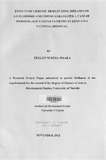| dc.description.abstract | Cancer is the leading cause of death in economically developed countries and the second leading cause of death in developing countries. It has increasingly becoming an important cause of morbidity and mortality in all regions of the world as it has been found to cause more deaths than TB, malaria and HIV / AIDS combined. In 2000, cancer was responsible for 12 per cent of the 56 million deaths from all causes worldwide. In 2008, there was an estimate of 12.7 million new cases of cancer around the world of which 56 per cent were in the developing world. It was also reported that there were 7.6 million deaths from cancer in same year out of which 64 per cent occurred in the developing world.
Assuming the underlying rates of cancer will remain unaltered, over the next two decades it is projected that by 2030, there will be almost 21.4 million new cancer cases diagnosed annually and there will be over 13.2 million deaths from cancer. In Africa, the cancer situation is alarming yet the general population have little or no information on cancer prevention and treatment options. Access to diagnostic and treatment facilities is hard and not affordable for a large part
. of the African population. In the context of competing priorities, limited resources and inadequately developed health care systems, countries in Africa face the harsh reality of cancer.
The research was designed to examine the effects of chronic debilitating diseases on livelihoods and coping strategies.
The objectives of this study were:
(i) To examine the effects of cancer in labour force participation;
(ii) To examine the effects of cancer on other livelihoods;
(iii) To find out strategies patient use to cope with cancer related effects.
The study used both primary and secondary data. In collecting primary data, both quantitative and qualitative methods of data collection were used. A total of 85 cancer patients within the working age bracket were purposefully selected for questionnaire survey. Also a total of 15 In-depth interviews were conducted with 15 purposefully selected cancer patients within the working age bracket. In addition, a total 5 Key informant interviews were conducted with cancer health care providers at the Cancer Treatment Centre in the Kenyatta National Hospital.
The study findings revealed that the effects of cancer on labour force participation and livelihoods are felt both by the cancer patients and their households. The disease affected negatively the labour force participation of the patients as well as the participation of other members of the household. Further, the disease greatly affected the livelihoods of the patients and those of their households through reduced earning, loss of income, reduced cultivation and use of household savings ~ seeking cancer care and treatment.
Cancer patients were found to employ certain coping strategies in effort to mitigate cancer related effects on their livelihoods like sale of family assets, borrowing, asking for assistance from friends and relatives. Whereas these strategies help them in the first instances, they later serve to deplete the resource base of affected households and contributed to their impoverishment through asset loss.
The study concluded that Cancer contributes to household impoverishment by negatively affecting the labour force participation of the affected people. It also negatively affected the resource base and livelihood assets of affected households through assets disposal. Cancer affects health, income, education, family relations and social roles. It is a socio-economic development issue that if not adequately tackled can lead to increased vulnerability to affected households and their eventual impoverishment. Cancer is an issue that warrants special attention because of its major implication to households and the society at large. | en_US |

